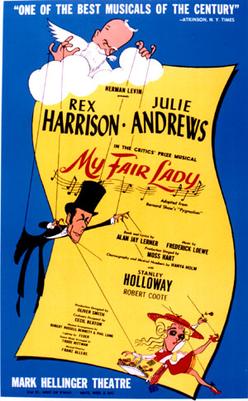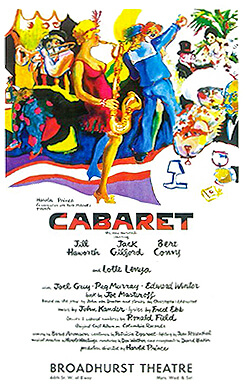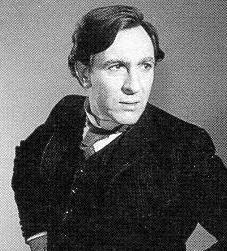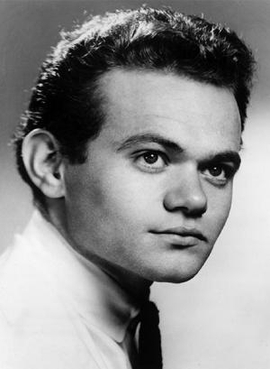Related Research Articles

My Fair Lady is a musical with a book and lyrics by Alan Jay Lerner and music by Frederick Loewe. The story, based on the 1938 film adaptation of George Bernard Shaw's 1913 play Pygmalion, concerns Eliza Doolittle, a Cockney flower girl who takes speech lessons from professor Henry Higgins, a phonetician, so that she may pass as a lady. Despite his cynical nature and difficulty understanding women, Higgins grows attached to her.

Musical theatre is a form of theatrical performance that combines songs, spoken dialogue, acting and dance. The story and emotional content of a musical – humor, pathos, love, anger – are communicated through words, music, movement and technical aspects of the entertainment as an integrated whole. Although musical theatre overlaps with other theatrical forms like opera and dance, it may be distinguished by the equal importance given to the music as compared with the dialogue, movement and other elements. Since the early 20th century, musical theatre stage works have generally been called, simply, musicals.
Born Yesterday is a play written by Garson Kanin which premiered on Broadway in 1946, starring Judy Holliday as Billie Dawn. The play was adapted into a successful 1950 film of the same name.
The Rose Tattoo is a three-act play written by Tennessee Williams in 1949 and 1950; after its Chicago premiere on December 29, 1950, he made further revisions to the play for its Broadway premiere on February 2, 1951, and its publication by New Directions the following month. A film adaptation was released in 1955. The Rose Tattoo tells the story of an Italian-American widow in Mississippi who has withdrawn from the world after her husband's death and expects her daughter to do the same.

Stanislaus Pascal Franchot Tone was an American actor, producer, and director of stage, film and television. He was a leading man in the 1930s and early 1940s, and at the height of his career was known for his gentlemanly sophisticate roles, with supporting roles by the 1950s. His acting crossed many genres including pre-Code romantic leads to noir layered roles and World War I films. He appeared as a guest star in episodes of several golden age television series, including The Twilight Zone and The Alfred Hitchcock Hour while continuing to act and produce in the theater and movies throughout the 1960s.
This is a list of notable events in music that took place in the year 1920.

Cabaret is an American musical with music by John Kander, lyrics by Fred Ebb, and a book by Joe Masteroff. It is based on the 1951 play I Am a Camera by John Van Druten, which in turn was based on the 1939 novel Goodbye to Berlin by Christopher Isherwood.

Sir Robert Graham Stephens was a leading English actor in the early years of Britain's Royal National Theatre. He was one of the most respected actors of his generation and was at one time regarded as the natural successor to Laurence Olivier.

An Ideal Husband is a four-act play by Oscar Wilde that revolves around blackmail and political corruption, and touches on the themes of public and private honour. It was first produced at the Haymarket Theatre, London in 1895 and ran for 124 performances. It has been revived in many theatre productions and adapted for the cinema, radio and television.

The Palace Theatre is a Broadway theater at 1564 Broadway, facing Times Square, in the Midtown Manhattan neighborhood of New York City. Designed by Milwaukee architects Kirchhoff & Rose, the theater was funded by Martin Beck and opened in 1913. From its opening to about 1929, the Palace was considered among vaudeville performers as the flagship venue of Benjamin Franklin Keith and Edward Franklin Albee II's organization. The theater had 1,648 seats across three levels as of 2018.

The Detroit Opera House is an ornate opera house located at 1526 Broadway Street in Downtown Detroit, Michigan, within the Grand Circus Park Historic District. The 2,700-seat venue is the home of productions of the Detroit Opera and a variety of other events. The theatre was originally designed by C. Howard Crane, who created other prominent theatres in Detroit including The Fillmore Detroit, the Fox Theater and the Detroit Symphony's Orchestra Hall. It opened on January 22, 1922.

The Heidi Chronicles is a 1988 play by Wendy Wasserstein. The play won the 1989 Pulitzer Prize for Drama.

Megan Gallagher is an American theater and television actress. Having studied at the Juilliard School under the supervision of John Houseman, Gallagher began her career on stage, and has appeared in several Broadway theatre productions, winning a Theatre World Award for her role in A Few Good Men.
Joseph Mielziner was an American theatrical scenic, and lighting designer born in Paris, France. He was described as "the most successful set designer of the Golden era of Broadway", and worked on both stage plays and musicals.
Joan Tewkesbury is an American film and television director, writer, producer, choreographer and actress. She had a long association with the celebrated director Robert Altman, writing the screenplays for Thieves Like Us (1974), and Nashville (1975), widely regarded as "Altman's masterpiece", and which earned her a nomination for the BAFTA Award for Best Screenplay.

Janis Paige was an American actress and singer. With a career spanning nearly 60 years, she was one of the last surviving stars from the Golden Age of Hollywood.

Zorba is a musical with a book by Joseph Stein, lyrics by Fred Ebb, and music by John Kander. Adapted from the 1946 novel Zorba the Greek by Nikos Kazantzakis and the subsequent 1964 film of the same name, it focuses on the friendship that evolves between Zorba and Nikos, a young American who has inherited an abandoned mine on Crete, and their romantic relationships with a local widow and a French woman, respectively.
Dennis Parichy is an American lighting designer. He won the 1980 Drama Desk Award for Talley's Folly and the Obie Award in 1981.

David Winters was an English-born American actor, dancer, choreographer, producer, distributor, director and screenwriter. At a young age, he acted in film and television projects such as Lux Video Theatre,Naked City; Mister Peepers,Rock, Rock, Rock, and Roogie's Bump. He received some attention in Broadway musicals for his roles in West Side Story (1957) and Gypsy (1959). In the film adaptation of West Side Story (1961) he was one of the few to be re-cast. It became the highest grossing motion picture of that year, and won 10 Academy Awards, including Best Picture.

Sherlock Holmes is a four-act play by William Gillette and Sir Arthur Conan Doyle, based on Conan Doyle's character Sherlock Holmes. After three previews it premiered on Broadway November 6, 1899, at the Garrick Theatre in New York City.
References
- 1 2 3 Owen, Bobbi (1991). Scenic design on Broadway: designers and their credits, 1915-1990. Greenwood Publishing Group, Incorporated. p. 76. ISBN 978-0-313-26534-1.
- ↑ Mavis, Paul (31 May 2013). The Espionage Filmography. McFarland. p. 473. ISBN 978-1-4766-0427-5.
- ↑ Kolker, Robert (8 June 2011). A Cinema of Loneliness. Oxford University Press. p. 452. ISBN 978-0-19-991053-3.